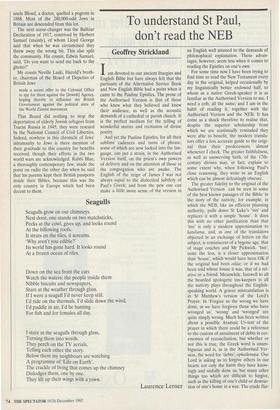To understand St Paul, don't read the NEB
Geoffrey Strickland
Iam devoted to our ancient liturgies and English Bible but have always felt that the partisans of the Alternative Service Book and New English Bible had a point when it came to the Pauline Epistles. The prose of the Authorised Version is that of those who knew what they believed and knew their audience, as well as the acoustic demands of a cathedral or parish church. It is the perfect medium for the telling of wonderful stories and recitation of divine poetry.
And yet the Pauline Epistles, for all their sublime cadences and turns of phrase, some of which are now locked into the lan- guage, can put a strain, in the Authorised Version itself, on the priest's own powers of delivery and on the attention of those in the congregation who are awake. The English of the reign of James I was not always equal to the dialectical subtlety of Paul's Greek; and from the pew one can make a little more sense of the version in an English well attuned to the demands of philosophical explanation. These advan- tages, however, seem less when it comes to reading the Epistles on one's own.
For some time now I have been trying to find time to read the New Testament every day in the original, helped occasionally by my linguistically better endowed half, to whom as a native Greek-speaker it is as familiar as the Authorised Version to me. I need a crib, all the same; and I am in the habit of reading it, together with the Authorised Version and the NEB. It has come as a shock therefore to realise that, despite the superior scholarship from which we are continually reminded they were able to benefit, the modern transla- tors offer a less accurate guide to the origi- nal than their predecessors, almost whenever I check. The greater faithfulness, as well as unswerving faith, of the 17th- century divines may, in fact, explain to some extent why, when following Paul's close reasoning, they write in an English which can be almost defeatingly obscure.
The greater fidelity to the original of the Authorised Version can be seen in some of the best known passages of the Bible: in the story of the nativity, for example, in which the NEB, like an efficient planning authority, pulls down St Luke's 'inn' and replaces it with a simple 'house'. It does this with no other justification than that 'inn' is only a modern approximation to kataluma, and, as one of the translators objected in an exchange of letters on the subject, is reminiscent of a bygone age, that of stage coaches and Mr Pickwick. 'Inn', none the less, is a closer approximation than 'house', which would have been OK if the original had been oikia; or if we had been told whose house it was, that of a rel- ative or a friend. Meanwhile, farewell to all the bearded apologetic inn-keepers in all the nativity plays throughout the English- speaking world. A graver mistranslation is in St Matthew's version of the Lord's Prayer. In 'Forgive us the wrong we have done, as we have forgiven those who have wronged us', 'wrong' and 'wronged' are quite simply wrong. Much has been written about a possible Aramaic Ur-text of the prayer in which there could be a reference to the custom of annulment of debts in cer- emonies of reconciliation, but whether or not this is true, the Greek word is unam- biguous and is, as in the Authorised Ver- sion, the word for 'debts', opheilemata. Our Lord is asking us to forgive others in our hearts not only the harm they have know- ingly and sinfully done us, but many other things too which are difficult to forgive, such as the killing of one's child or destruc- tion of one's home in a war. The crude flat-
ness of the NEB (and, for that matter, the quaintness of the Prayer Book's 'trespass- es') obliterates the precision and the truth to human nature of the one prayer above all others we need.
In the Pauline Epistles, the inaccuracies take the form not so much of flatness as of an apologetic and confusing (though, in intention perhaps, reassuring) vagueness. The translators fight shy of St Paul's radical distinction between 'the flesh' and 'the spir- it': For when we were in the flesh, the motions of sins, which were by the law, did work in our members to bring forth fruit unto death. .. (Romans, VII, 5, in the AV.)
Yet, however puzzling or distasteful we may find the dichotomy, there is no more faithful rendering of en tel sarki than 'in the flesh' or of dia tou nomou than `by the law'. The NEB offers more an explanatory com- mentary than a faithful translation of Paul's actual words: While we lived on the level of our lower nature, the sinful passions evoked by the law worked in our bodies, to bear fruit for death .. .
The flesh has again melted from Romans VII, 14. Compare the AV:
For we know that the law is spiritual: but I am carnal...
with the original ego de sartikos eimi; and with the NEB:
We know that the law is spiritual; but I am not: I am unspiritual .
The physicality of Paul is crucial to his appeal to the innermost being of his audience; so much so that his metaphors are best understood when taken quite literally. They are not like the metaphors which become colloquial synonyms for other terms with which they are inter- changeable, such as 'yellow' in modern Anglo-American slang for 'cowardly'. Take the metaphors of walking and running, which have something more rather than something other than literal application:
There is therefore now no condemnation to them which are in Christ Jesus, who walk [penpatousinJ not after the flesh, but after the Spirit . . .
. .. that the righteousness of the law might be fulfilled in us who walk not after the flesh . . . (Romans, VIII,land4in the AV.)
So then it is not of him that willeth, nor of him that runneth (trechontos) of God that sheweth mercy . . . (Romans, IX,16, in the AV.)
Paul walked over much of the Roman Empire and knew what it was precisely to set his eyes on and direct his steps towards the goal he believed that Christ would have shared. The metaphor of walking is one of those that make sense of what can other- wise sound like incomprehensible cliché, Paul's continual reference to speaking and living 'in Christ'. The metaphor is taken up by St Augustine in his own development of Paul's revolutionary analysis of the divided and undivided will, as in
Now if I do that I would not, it is no more I that do it, but sin that dwelleth in me . . . (Romans VII, 20 in the AV.) For Augustine, the accomplishment of immediate practical ends, for those to whom God has given the grace to know truly what they desire, is like the momen- tary 'resting of the foot as one walks' (requiem pedis . . . in ambulando) and allows the other foot to overtake it (De Ttinitate, XI, vi, 10).
Both the simplicity and the subtlety of Paul are lost in the circumlocutions of the NEB. Compare with the above the follow- ing: There is no condemnation for those who are united with Christ Jesus, because in Christ Jesus the life-giving law of the Spirit has set you free from the law of sin and death . . . (Romans, VIII, I).
That the commandment of the law may find fulfilment in us, whose conduct, no longer under the control of our lower nature, is directed by the Spirit ... (Romans, VIII, 4).
Thus it does not depend on man's will or effort, but on God's mercy. . . (Romans, IX, 16).
And if what I do is against my will, clearly it is no longer I who am the agent, but sin that has its lodging in me ... (Romans, VII, 20).
The italics are, of course, my own. It will be seen that in this last example the NEB con- fuses Paul's deliberately disconcerting mes- sage concerning the will and personal identity by introducing a third abstract enti- ty, 'the agent'.
As I read on through the Epistles, I feel I could go on illustrating the same general point ad nauseam, which is not the best way to begin the day. The NEB, in its anxiety to sound reasonable to a modern ear, continually excises all that might seem recalcitrant to the modern mind. Take two final examples: the first, Paul's list of the offences which will exclude you from the Kingdom of Heaven.
In I Corinthians, VI, 9, Paul excludes the malakoi, i.e. masturbators (or, as the AV, which seems slightly unsure what is meant at this point, calls them, 'the abusers of themselves with mankind'), along with the idolaters, adulterers, drunkards and homo- sexuals, from any hope of salvation. The NEB bowdlerises St Paul and simply excludes them from the list. The congrega- tion of the local Orthodox Church was, however, not thus spared this last Holy Week and was sternly reminded of the rules. These were clearly understood. Malakas is still the usual Greek word, and a common insult during the rush hour in Athens.
In I Corinthians, XIV, Paul dwells on the topic, dangerous at any time, in his as in ours, of speaking in tongues. The success of the Apostles after the miracle of Pentecost in making themselves understood to the many foreigners in Jerusalem, including
even the Libyans, was for Paul, as for us, an article of faith. He puts the Corinthians on their guard, however, against the pointless exercise of this gift, especially when the speaker addresses his friends in a foreign tongue which they don't happen to under- stand: For he that speaketh in an unknown tongue speaketh not unto men, but unto God: for no man understandeth him; howbeit in the spirit he speaketh mysteries.
Paul does not wish to deride the practice and, referring perhaps to his own genuine linguistic skills, thanks God that he speaks with tongues more than ye all: yet in the church I had rather speak five words with my understanding, that by my voice I might teach others also, than ten thousand words in an unknown tongue. (I Corinthians, XIV, 18-19).
He is both practical and diplomatic.
Pentecostal inspiration is at odds, however, with the modern religious spirit, except in its wilder charismatic forms. The word Whitsun itself has disappeared from common usage since it was replaced by the two meaningless May holidays. (Mean- while, both La Pentecote and l'Ascension are observed as holidays in the militantly secular French Republic.) The NEB avoids using the slightly embarrassing phrase 'speaking with tongues' and, in defiance of the Greek, talks instead of the 'language' and 'tongues' of 'ecstasy' (I Corinthians,
XIV, passim). The language of ecstasy' is more convenient in that it can mean almost anything and is far less easily subject to testing for its authenticity.
There is perhaps a moral to be drawn from the NEB's reluctance to countenance the possibility of speaking in tongues and to translate Paul accurately when he says he believes it can be done. The penalty for such lack of faith in this particular instance is to end up by speaking no tongue at all, not even ordinary meaningful English.












































































































 Previous page
Previous page